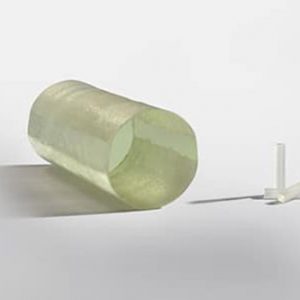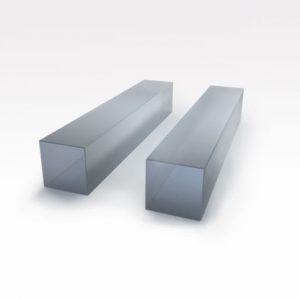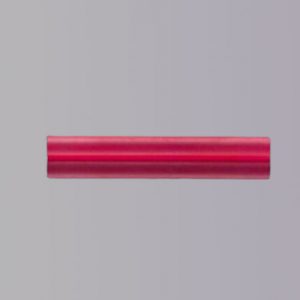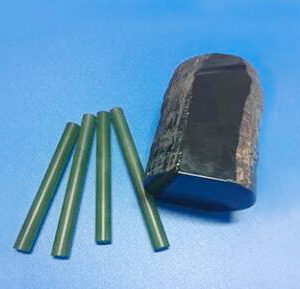- Solid State Laser
- Semiconductor Laser
- DPSS laser
- Gas Laser
- Fiber Laser
- Fiber Coupled Laser(MM)
- Fiber Coupled Laser(SM)
- Ultrafast laser
- Femtosecond Laser
- Picosecond Laser
- Pulsed Laser
- Q-switched Laser
- Raman Laser
- Narrow Linewidth Fiber Laser
- Wavelength Tunable Laser
- Laser Diode
- Laser Module
- Pigtailed Laser
- DFB Laser
- DBR Laser
- SLED Laser
- VCSEL Laser
Nd:Glass – Laser Crystal – Gain Medium – Customized Products
N31 Phosphate glass is specially developed for high-power laser facilities. N31 is a good material that has the characteristics of high energy storage, large excitation cross-section, and long fluorescence lifetime. It is also easy to prepare glass with large size and good optical uniformity, so it is widely used in high-power laser systems. At present, it has been successfully applied in Shen Guang Ⅱ and Shen Guang Ⅲ systems.
N41 Neodymium-doped phosphate glass has a high stimulated emission cross-section, low nonlinear refractive index, and good thermal characteristics, especially for high-power laser facilities. N41 has a lower refractive index than N21 and N31.
N51 Neodymium-doped phosphate glass has the characteristics of high energy storage, large stimulated emission cross-section, long fluorescence lifetime, and easy preparation of large size and good optical uniformity. Therefore, it is widely used as an amplifier working substance in a high-power laser system.
NAP Neodymium-doped phosphate glass is created especially for high-average power applications. NAP2 and NAP4 are two types of new laser glass with high thermal shock resistance properties, which have higher thermal conductivity, lower coefficient of thermal expansion and modest emission cross-section. They are served for laser systems with high repetition rates and high energy rates and high energy, which have broad applications in laser ranger, laser peening and pump laser for OPCPA systems.
NF Nd-doped Fluorophosphate glass has the characteristics of low nonlinear coefficient, high fluorescence lifetime, easy large-scale preparation, excellent glass forming performance and good crystallization stability, and meets the requirements for energy storage and amplification of high-energy laser systems. Two kinds of NF glass.
NSG2 Nd doped silicate glass is a laser glass with neodymium as an active ion and silicate glass as the base body. It has a larger stimulated emission cross-section and wider effective fluorescence line width. Also, it has good laser performance and gains performance. It can be widely used in the manufacture of lasers. This wider line of glass and the availability of narrower ultrashort pulses make it the first choice for lasers with high energy and high peak power.
Note:
$100 is a deposit, not the final price of the product. Please contact us for price if needed.
Laser Specifications
| N31 | N41 | N51 | NAP | ||
| NAP2 | NAP4 | ||||
| wt% | 3.5(Nd2O3) | 4.6(Nd2O3) | 4.0(Nd2O3) | \ | \ |
| Nd3+ conc.(1020ions/cm3) | 3.4±0.1 | 4.3±0.1 | 3.9±0.1 | \ | \ |
| Cross section for stimulated emission(10-20cm2) | 3.8±0.1 | 3.9±0.1 | 4.3±0.1 | 3.6±0.1 | 3.1±0.1 |
| Lifetime at 1053nm(μsec) | ≥370 (Nd2O3:0.5wt%) | ≥370(Nd2O3:0.5wt%) | ≥375(Nd2O3:0.5wt%) | ≥360(Nd2O3:0.5wt%) | ≥370(Nd2O3:0.5wt%) |
| ≥360 (Nd2O3:1.2wt%) | ≥360(Nd2O3:1.2wt%) | ≥365(Nd2O3:1.2wt%) | ≥350(Nd2O3:1.0wt%) | ≥360(Nd2O3:1.0wt%) | |
| ≥315 (Nd2O3:3.5wt%) | ≥315(Nd2O3:3.5wt%) | ≥320(Nd2O3:3.5wt%) | ≥330(Nd2O3:2.0wt%) | ≥330(Nd2O3:2.0wt%) | |
| ≥310 (Nd2O3:4.2wt%) | ≥310(Nd2O3:4.6wt%) | ≥315(Nd2O3:4.2wt%) | ≥310(Nd2O3:3.0wt%) | ≥310(Nd2O3:3.0wt%) | |
| Effective bandwidth(nm) | 25.4 | 25.5 | 24.5 | 25.4 | 28.5 |
| Fluorescence peak wavelength(nm) | 1053 | 1053 | 1053 | 1052 | 1052 |
| Absorption coefficient(cm-1) | ≤0.0015(1053nm) | ≤0.0015(1053nm) | ≤0.0015(1053nm) | ≤0.0015(1053nm) | ≤0.002(1053nm) |
| ≤0.25(400nm) | ≤0.25(400nm) | ≤0.25(400nm) | ≤0.25(400nm) | ≤0.3(400nm) | |
| ≤1.5(3333nm) | ≤1.5(3333nm) | ≤1.5(3333nm) | ≤1.5(3333nm) | ≤1.5(3333nm) | |
| NF | NSG2 | ||
| NF1 | NF2 | ||
| wt% | 0.88(NdF3) | 1.07(NdF3) | \ |
| Nd3+ conc.(1020ions/cm3) | 0.2±0.1 | 1.2±0.1 | \ |
| Cross section for stimulated emission(10-20cm2) | 2.7±0.1 | 3.4±0.1 | 2.7±0.1 |
| Lifetime at 1053nm(μsec) | ≥515(NdF3:0.53wt%) | ≥430(NdF3:0.53wt%) | ≥380(Nd2O3:0.5wt%) |
| ≥360(Nd2O3:1.0wt%) | |||
| ≥495(NdF3:1.07wt%) | ≥410(NdF3:1.07wt%) | ≥330(Nd2O3:2.0wt%) | |
| ≥270(Nd2O3:3.0wt%) | |||
| Effective bandwidth(nm) | 32.8 | 30.4 | 34 |
| Fluorescence peak wavelength(nm) | 1053 | 1053 | 1060 |
| Absorption coefficient(cm-1) | ≤0.001(1053nm) | ≤0.001(1053nm) | ≤0.0015(1053nm) |
| ≤0.04(400nm) | ≤0.04(400nm) | ||
| ≤0.08(3333nm) | ≤0.08(3333nm) | ||
Optical Specifications
| N31 | N41 | N51 | NAP | NF | NSG2 | |||
| NAP2 | NAP4 | NF1 | NF2 | |||||
| Nonlinear Refractive index Coefficient n2(×10-13e.s.u) | ≤1.2 | ≤1.04 | ≤1.04 | ≤1.25 | ≤1.10 | ≤0.6 | ≤0.86 | ≤ 1 . 6 |
| Refractive Index(1053 nm) | 1.535±0.003 | 1.504±0.003 | 1.505±0.003 | 1.537±0.003 | 1.515±0.005 | 1.464±0.003 | 1.514±0.003 | 1.560±0.003 |
| Abbe value | 65.6 | 68.2 | 68.2 | 67 | 67 | 88 | 77 | 59 |
| dn / dt(10-6 /℃)(20〜100℃) | -4.3 | \ | -9 | -9 | 1.9 | -8.84 | -8.6 | 2 |
Thermal specification
| N31 | N41 | N51 | NAP | NF | NSG2 | |||
| NAP2 | NAP4 | NF1 | NF2 | |||||
| Transformation Temperature(℃) | 445 | 467 | 408 | 500 | 545 | 450 | 490 | 485 |
| Softening Temperature(℃) | 485 | 503 | 448 | 550 | 600 | 491 | 528 | 530 |
| Coefficient of Linear Thermal Expansion(10-7 / K)(30〜100℃) | 116 | 129 | 141 | 87 | 63 | 152 | 142 | 95 |
| Thermal Coefficient Optical Path Length(10-6/ K)(50〜100℃) |
1.4 | \ | -1.9 | 3.8 | 5 | -1.86 | -1.2 | 7 |
| Thermal Conductivity (25℃)(W / Mk) |
0.59 | \ | \ | 0.76 | 0.88 | 0.865 | \ | 1.2 |
| Specific Heat Capacity(25℃)(J / Gk) | 0.75 | \ | \ | 0.757 | 0.775 | \ | \ | \ |
Other Specifications
| N31 | N41 | N51 | NAP | NF | |||
| NAP2 | NAP4 | NF1 | NF2 | ||||
| Density g/cm3 | 2.87 | 2.62 | 2.7 | 2.84 | 2.58 | 3.65 | 3.68 |
| Young’s Modulus(Gpa) | 58.3 | 52.4 | 45.2 | 58 | 67 | 73 | 76 |
| Poisson Ratio | 0.26 | 0.25 | 0.26 | 0.25 | 0.25 | \ | \ |
| Knoop Hardnes(kg/cm2) | 404 | 347 | 302 | 382 | 549 | 343 | 423 |
| Breaking Tenacity(Mpa.m1 / 2) | 0.58 | 0.62 | 0.66 | 0.68 | 0.74 | 0.35 | 0.58 |
| Deliquescence coefficient(H2O 98℃)(mg /(cm2 /day)) | \ | 0.41 | 2.2 | 0.003 | 0.002 | \ | \ |
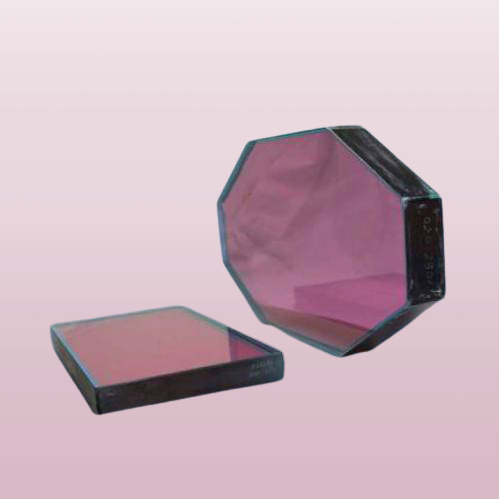
.jpg)
